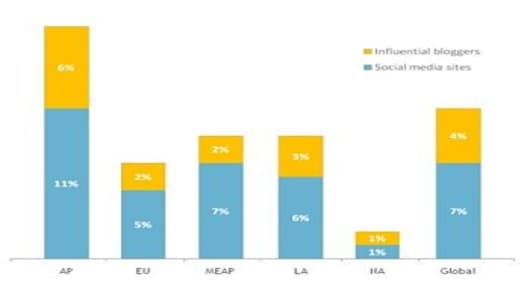Singaporean celebrity Shen Qiao Yun used to act by day and blog by night. Her web posts - fun, quick updates about her daily life - struck a chord with the online audience. In a span of four years, she chalked up 30,000 unique followers and advertisers started knocking. By 2008, she was earning so much money from her blog, she quit her day job.
Today, Shen, better known by her blog name, Sheylara, serves as Microsoft's X-box brand ambassador in Singapore. Her website - Sheylara.com – which boasts 30,000 unique visitors a month, has attracted advertisers such as Nike, L’Oreal, Citibank and Standard Chartered. She and three friends were invited Disneyland earlier this year, for an all-expense trip to the Hong Kong theme park which she reviewed on her blog. Shen now earns about S$5,000 a month from her blog, enough for her to make a living doing something she loves.
“It’s the most awesome thing in the world,” she says. “I wake up every day, appreciative and thankful. Life is really good for me right now.”
With social media reaching more people in Asia every day, advertisers are increasingly turning to bloggers, like Shen, as the next generation of product endorsers to raise their profile online. The region’s so-called blogosphere is booming: in China alone, the number of netizens who blog grew 4.5 percent to 231 million between December and June, according to the China Internet Network information Center.
Research has shown that Asian consumers, in particular, are increasingly relying on blogs in their purchases. According to Nielsen’ssecond quarter Global Consumer Report, just over 60 percent of Asia Pacific consumers use social media — including social networking sites and blogs — sites to help them make purchase decisions, compared to 43 percent globally. About 6 percent of Asian consumers identified “influential bloggers” as one of their top three trusted sources of recommendations when making a purchase decision; only 1 percent of North Americans said the same, and just 2 percent of Europeans, according to Nielsen’s April Consumer Confidence Survey.
Experts say consumers in emerging markets like China, where the Internet is rapidly expanding, are inclined to seek out a personal review of a product online, especially if they’ve never heard of the brand before.
“A lot of foreign brands are flooding into the market, and the local consumer hasn’t formed a loyalty to these brands yet,” says Patrick Pun, CEO of Newcogs Ltd, a Chinese company that sells ads on a network of sites, including blog portals and social network pages. Newcogs, which began operation in June 2009, already has a database of 1.5 million social networking sites and blogs.
In short, blogs in the region have become an important piece of ad real estate.
“Blogs today are mainstream, and they occupy a large piece of the Internet landscape in Asia. If anyone ignores them, it’s their folly,” says Cheo Ming Sheng, co-founder of Nuffnang, a company that packages website among its network of bloggers for advertisers who want to reach a particular demographic.
The rapid growth of Singapore-based Nuffnang illustrates the nascent boom in blog advertising. The company’s revenue grew 250 percent to nearly S$10 million this year, according to Cheo. Nuffnang, which opened for business in Singapore and Malaysia in 2007, has since expanded to Australia and the Philippines, and will begin operating in China and Hong Kong by the end of this month (November).
Women’s blogs, particularly those that focus on families, are extremely popular among advertisers; food and tech blogs are also high on the radar screen. The rise of Nuffnang and its competitors over the last three years, meanwhile, have made blogs attractive to big advertisers because they help create scale.
“One blogger alone doesn’t mean anything to an advertiser, but if I put 1,000 of them together, it’s a different story. Suddenly advertisers have access to a targeted audience across one or more countries,” says Cheo, which has Sheylara.com in its network.
The rise in blog ads have sparked criticism that bloggers run a credibility risk, but companies like Nuffnang argue that blogs that take on ads are no different from conventional newspapers or magazines that do the same. There is a risk to the reputation of the bloggers, Cheo says, only if they write promotional posts about their sponsor's products without stating clearly what they are doing.
"When you write an advertorial (online), there (must be) full disclosure that it's an advertorial," says Cheo. "It's the same as an advertorial in a magazine or newspaper."



